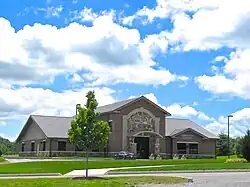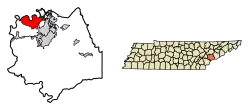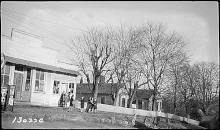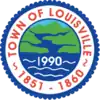Louisville, Tennessee
Louisville is a suburban town in Blount County, Tennessee.[5] Its population was 4,384 at the 2020 census.[6] It is included in the Knoxville, Tennessee Metropolitan Statistical Area.
Louisville | |
|---|---|
 Louisville Town Hall | |
 Location of Louisville in Blount County, Tennessee. | |
| Coordinates: 35°49′29″N 84°03′19″W | |
| Country | United States |
| State | Tennessee |
| County | Blount |
| Government Home Rule Charter | |
| • Type | Mayor-Aldermen |
| Area | |
| • Total | 17.05 sq mi (44.17 km2) |
| • Land | 14.92 sq mi (38.64 km2) |
| • Water | 2.13 sq mi (5.53 km2) |
| Elevation | 817 ft (249 m) |
| Population | |
| • Total | 4,384 |
| • Density | 293.81/sq mi (113.44/km2) |
| Time zone | UTC-5 (Eastern (EST)) |
| • Summer (DST) | UTC-4 (EDT) |
| ZIP code | 37777 |
| Area code | 865 |
| FIPS code | 47-43820[4] |
| GNIS feature ID | 2404960[2] |
| Website | www |
History
The Louisville area was settled in the early 1800s, and its situation on the Tennessee River helped it grow into a key flatboat and steamboat port. It was incorporated in 1851. The town's namesake is unknown, although some have suggested that its name was influenced by the French King Louis Philippe, who visited the area in the late 1790s.[7] In 1974 Louisville's downtown was declared a national historic district by the National Register of Historic Places.[8]
Geography
Louisville is located along the northern border of Blount County. The town is centered around the junction of State Route 334 (Louisville Road), which connects Louisville with Alcoa and Maryville to the east, and State Route 333, which connects Louisville with Friendsville to the west. The Fort Loudoun Lake impoundment of the Tennessee River comprises Louisville's northern border.
According to the United States Census Bureau, the city has a total area of 13.5 square miles (35.0 km2), of which 11.7 square miles (30.4 km2) is land and 1.8 square miles (4.6 km2), or 13.18%, is water.[6]
Demographics
| Census | Pop. | Note | %± |
|---|---|---|---|
| 1880 | 215 | — | |
| 1890 | 314 | 46.0% | |
| 2000 | 2,001 | — | |
| 2010 | 2,439 | 21.9% | |
| 2020 | 4,384 | 79.7% | |
| Sources:[9][10][3] | |||
2020 census
| Race | Number | Percentage |
|---|---|---|
| White (non-Hispanic) | 3,975 | 90.67% |
| Black or African American (non-Hispanic) | 80 | 1.82% |
| Native American | 14 | 0.32% |
| Asian | 29 | 0.66% |
| Other/Mixed | 175 | 3.99% |
| Hispanic or Latino | 111 | 2.53% |
As of the 2020 United States census, there were 4,384 people, 1,753 households, and 1,276 families residing in the city.
2000 census
As of the census[4] of 2000, there were 2,001 people, 808 households, and 581 families residing in the city. The population density was 172.8 inhabitants per square mile (66.7/km2). There were 886 housing units at an average density of 76.5 per square mile (29.5/km2). The racial makeup of the city was 95.85% White, 2.15% African American, 0.35% Native American, 0.50% Asian, 0.25% from other races, and 0.90% from two or more races. Hispanic or Latino of any race were 0.90% of the population.

There were 808 households, out of which 28.5% had children under the age of 18 living with them, 61.4% were married couples living together, 6.8% had a female householder with no husband present, and 28.0% were non-families. 24.4% of all households were made up of individuals, and 8.0% had someone living alone who was 65 years of age or older. The average household size was 2.44 and the average family size was 2.91.
In the city the population was spread out, with 22.4% under the age of 18, 6.6% from 18 to 24, 29.5% from 25 to 44, 29.8% from 45 to 64, and 11.7% who were 65 years of age or older. The median age was 40 years. For every 100 females, there were 96.8 males. For every 100 females age 18 and over, there were 96.1 males.
The median income for a household in the city was $40,950, and the median income for a family was $53,558. Males had a median income of $34,688 versus $26,010 for females. The per capita income for the city was $22,086. About 8.2% of families and 12.1% of the population were below the poverty line, including 20.9% of those under age 18 and 11.3% of those age 65 or over.
Schools
Public
- Middlesettlements Elementary School (Blount County Schools system, K-5)
Private
- New Horizon Montessori School (grades pre-K through 5)
- Montessori Middle School (grades 6-8)
- Peninsula Village School (ages 13–18)
Notable person
- Milburn White, member of the Tennessee House of Representatives[12]
References
- "ArcGIS REST Services Directory". United States Census Bureau. Retrieved October 15, 2022.
- U.S. Geological Survey Geographic Names Information System: Louisville, Tennessee
- "Census Population API". United States Census Bureau. Retrieved October 15, 2022.
- "U.S. Census website". United States Census Bureau. Retrieved January 31, 2008.
- "Welcome to the Town of Louisville". Town of Louisville, Tennessee. Retrieved August 2, 2020.
- "Geographic Identifiers: 2010 Demographic Profile Data (G001): Louisville city, Tennessee". U.S. Census Bureau, American Factfinder. Archived from the original on February 12, 2020. Retrieved April 8, 2014.
- "Water Floats a Lot of History in Loo-is-ville Archived 2007-06-29 at archive.today." Knoxville, Tennessee Community Guide, 2007. Retrieved: 29 December 2007.
- "Louisville Historic District". Database. National Register of Historic Places. December 12, 1974. Archived from the original on February 20, 2013. Retrieved October 16, 2011.
- "Census of Population and Housing: Decennial Censuses". United States Census Bureau. Retrieved March 4, 2012.
- "Incorporated Places and Minor Civil Divisions Datasets: Subcounty Resident Population Estimates: April 1, 2010 to July 1, 2012". Population Estimates. U.S. Census Bureau. Archived from the original on June 11, 2013. Retrieved December 11, 2013.
- "Explore Census Data". data.census.gov. Retrieved December 26, 2021.
- Cornwell 1988, p. 709.
Works cited
- Cornwell, Ilene (1988). Biographical Directory of the Tennessee General Assembly Volume III: 1901-1931. Tennessee Historical Commission. ISBN 0874020085.
External links
![]() Media related to Louisville, Tennessee at Wikimedia Commons
Media related to Louisville, Tennessee at Wikimedia Commons
